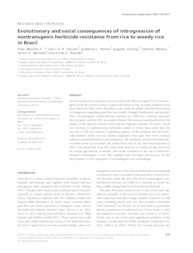Evolutionary and social consequences of introgression of nontransgenic herbicide resistance from rice to weedy rice in Brazil.
Evolutionary and social consequences of introgression of nontransgenic herbicide resistance from rice to weedy rice in Brazil.
Autoria: MEROTTO JUNIOR, A.; GOULART, I. C. G. dos R.; NUNES, A. L.; KALSING, A.; MARKUS, C.; MENEZES, V. G.; WANDER, A. E.
Resumo: Several studies have expressed concerns about the effects of gene flow from transgenic herbicide-resistant crops to their wild relatives, but no major problems have been observed. This review describes a case study in which what has been feared in transgenics regarding gene flow has actually changed biodiversity and people?s lives. Nontransgenic imidazolinone-resistant rice (IMI-rice) cultivars increased the rice grain yield by 50% in southern Brazil. This increase was beneficial for life quality of the farmers and also improved the regional economy. However, weedy rice resistant to imidazolinone herbicides started to evolve three years after the first use of IMI-rice cultivars. Population genetic studies indicate that the herbicide- resistant weedy rice was mainly originated from gene flow from resistant cultivars and distributed by seed migration. The problems related with herbicideresistant weedy rice increased the production costs of rice that forced farmers to sell or rent their land. Gene flow from cultivated rice to weedy rice has proven to be a large agricultural, economic, and social constraint in the use of herbicideresistant technologies in rice. This problem must be taken into account for the development of new transgenic or nontransgenic rice technologies.
Ano de publicação: 2016
Tipo de publicação: Artigo de periódico
Unidade: Embrapa Florestas
Observações
1 - Por padrão são exibidas publicações dos últimos 20 anos. Para encontrar publicações mais antigas, configure o filtro ano de publicação, colocando o ano a partir do qual você deseja encontrar publicações. O filtro está na coluna da esquerda na busca acima.
2 - Para ler algumas publicações da Embrapa (apenas as que estão em formato ePub), é necessário ter, no celular ou computador, um desses softwares gratuitos. Sistemas Android: Google Play Livros; IOS: iBooks; Windows e Linux: software Calibre.
Acesse outras publicações
Acesse a Base de Dados da Pesquisa Agropecuária (BDPA) para consultar o acervo completo das bibliotecas da Embrapa.

